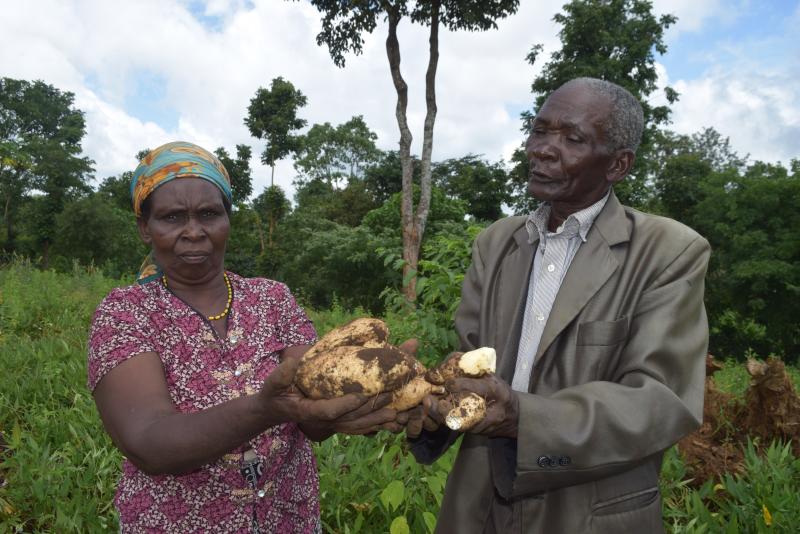
By Eastern Newspaper Correspondent
Farmers of different crops in Meru are grappling with a lack of markets for their produce.
The farmers who have large portions of their land occupied by different high-value crops are not reaping profits for lack of proper marketing systems.
They lament they had been neglected and do not receive assistance like farmers who grow some other crops.
Green grams, sweet potato, rice, nuts, fruits, vegetables, and other types of farm produce are now crying foul.
Agostino Kaaru, a large scale sweet potato farmer from Karirwara in Nyaki East, says the government is discriminating against those who grow it, yet they pay cess and other fees, just like other farmers.
He argued that unlike Irish potato farmers and now miraa whose crops receive government support through various legislation and inputs, sweet potato growers are an abandoned lot.
“Coffee, tea, and other farmers get a lot of government support. But we do not get any form of help. But they are taxing us dry!” said Mr. Kaaru.
The hated and exploitative extended bags are just one of the myriad challenges facing them.
“The brokers force us to use extended bags. One 50kg bag contains 80kg of potatoes when extended. Losing 30kg from each bag is too much and that is why we are demanding protection from the government. We feel discriminated against, yet we invest a lot of cash to produce just like the Irish potato and other farmers,” he said.
But that is not the only group of farmers ruing the situation.
A crucial rice production project in Tigania West in Meru is on the brink of total collapse due to a lack of market for the product.
Hundreds of rice farmers in the sub-county are staring at an uncertain future as they are forced to sell it at throwaway prices due to lack of capacity to reach good markets.
Since 2009, the farmers used the water from the Kiorimba-Machegene Irrigation Scheme and Muungano water project to produce large volumes, for sale and subsistence.
The farmers said the initiative, partly supported by International Fund for Agricultural Development (IFAD) and the national government brought them good money and ensured they lacked no food.
But now lack of market and poor roads have negated the project, with many of them abandoning the crop for traditional crops like maize and beans, mainly for domestic consumption.
Rice farmers we talked to said though they still had parcels of varied sizes under rice, they were a discouraged lot because of the inability to get ‘good buyers’.
“When we started growing rice, hundreds of locals came on board. Rice farming was unknown here, but the irrigation projects and good soils, coupled with quality Nerica rice seeds we got from the national government, gave us a lot of rice and good money.
We sold it to brokers at between Sh60 and Sh70 a kilogram initially. But at some point, the prices dropped because of the unscrupulous brokers, and bad roads that made it impossible for us to take it to Meru town. We need support to restart it proper and elimination of brokers, and access to markets,” said Reuben Kamandu, from Machegene.
Rice farming is done in Machegene, Kiorimba, Kaboto near the Meru-Tharaka border, and other areas
Cyprian Gitonga and Joel Gautia, who still grow the popular Nerica type, said they earned significant amounts of money from it at the beginning before brokers swarmed the area and bad roads which made it impossible to transport it to markets hit them hard.
“We produced very large amounts of rice in the initial seasons. Though many were discouraged because of the drop in prices, many of us still grow it, but mainly for our use. We sell a little to neighbors who no longer grow it, at Sh50 and even lower,” said Mr. Gitonga.
Mr. Gautia said so well were the returns that they planted two crops in a year.
“We are ready to re-start production, but first we need partners who can link us to good markets and increase production,” Mr. Gautia said.
He, like some of the farmers, opted to grow sorghum which he says earns him good money, but not like rice.
“The cost of production of sorghum and labor is higher than rice. We need good markets so that we can do contract farming of rice,” he added.
Green grams farmers are another group castigating the two governments for not supporting them.
Dennis Kimathi, says: “When the county and national government encouraged us to produce green grams we put all our efforts and money in it, especially after they promised to buy from as high as Sh100 a kilo. But our hopes were shattered after they did not honor their part of the agreement. We were left to sell at throwaway prices, even at Sh25 a kilo.”




